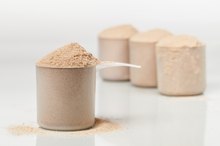What does fact checked mean?
At Healthfully, we strive to deliver objective content that is accurate and up-to-date. Our team periodically reviews articles in order to ensure content quality. The sources cited below consist of evidence from peer-reviewed journals, prominent medical organizations, academic associations, and government data.
- Journal of the International Society of Sports Nutrition: Dietary Protein Safety and Resistance Exercise: What Do We Really Know?
- Journal of the International Society of Sports Nutrition: Dietary Protein Safety and Resistance Exercise: What Do We Really Know?
- Journal of the International Society of Sports Nutrition: Metabolic Responses to High Protein Diet in Korean Elite Bodybuilders with High-intensity Resistance Exercise
- Journal of the International Society of Sports Nutrition: Metabolic Responses to High Protein Diet in Korean Elite Bodybuilders with High-intensity Resistance Exercise
- Journal of the International Society of Sports Nutrition: Contemporary Issues in Protein Requirements and Consumption for Resistance Trained Athletes
- Journal of the International Society of Sports Nutrition: Contemporary Issues in Protein Requirements and Consumption for Resistance Trained Athletes
The information contained on this site is for informational purposes only, and should not be used as a substitute for the advice of a professional health care provider. Please check with the appropriate physician regarding health questions and concerns. Although we strive to deliver accurate and up-to-date information, no guarantee to that effect is made.
Hemp Seed for Building Muscle
For thousands of years, various cultures have used hemp for clothing, food and medicine -- even George Washington and Thomas Jefferson grew the plant on their farms. Today, hemp seed is used in food products and supplements, with sales of hemp protein powder increasing 21 percent from 2007 to 2008, according to the market research firm SPINS. Hemp supplement makers often target bodybuilders, but though hemp seed is rich in proteins needed for building strong, healthy muscles, it does not have any magic muscle-building properties.
Hemp Seed
It's easy to confuse hemp with marijuana because they're from the same plant family, Cannabis sativa L. However, hemp is created for industrial use from the stalks and seeds of any of the 1,000 plant varieties, whereas marijuana refers to the flowers and leaves of certain varieties that are smoked. Further, hemp seed is low in tetrahydrocannabinol, or THC, the psychoactive component in marijuana. Findings published in the "Journal of Analytical Toxicology" in 2008 showed that hemp foods in the marketplace do not contain detectable levels of THC. Despite its name, hemp seed isn't really a seed; it's a nut covered with a hard shell that can be eaten raw, roasted or ground into meal or oil. Hemp seed muscle-building supplements are typically in the form of powders or protein bars.
- It's easy to confuse hemp with marijuana because they're from the same plant family, Cannabis sativa L. However, hemp is created for industrial use from the stalks and seeds of any of the 1,000 plant varieties, whereas marijuana refers to the flowers and leaves of certain varieties that are smoked.
Nutritional Benefits
Soy Vs. Hemp Protein
Learn More
Whole hemp seed is high in oil and fiber, and it also contains B vitamins, vitamin E, trace minerals, and phytosterols, which are compounds that work in the intestine to lower cholesterol absorption. But it is the protein in hemp seed that is important for muscle. Whole hemp seed contains up to 25 percent protein, with more essential fatty acids than any other plant source. Hemp protein is composed of the proteins albumin and edestine, both of which are easily digested. Hemp seed oil is rich in omega-3 fatty acids, especially alpha-linolenic acid and linoleic acid. Hemp seed protein was first used as a muscle booster in the 1950s in Eastern Europe to treat the muscle wasting caused by tuberculosis.
- Whole hemp seed is high in oil and fiber, and it also contains B vitamins, vitamin E, trace minerals, and phytosterols, which are compounds that work in the intestine to lower cholesterol absorption.
Muscle-Buildling Properties
Strength-training athletes need more protein, which a 2006 article in the "Journal of the International Society of Sports Nutrition" reported was due to increased oxidation of amino acids during exercise, the repair of damaged muscles and the need for elevated protein synthesis to build muscle tissue 456. AFAA Certified Personal Trainer Billy Locke says that hemp protein is the best protein for building muscle and promoting overall health because its nutrient density is greater than other protein powders. Plus, it's filled with bioavailable enzymes and good bacteria to facilitate the conversion of amino acids to muscle.
Legal Considerations
Are There Any Side Effects of Protein Powder?
Learn More
The United States is the only industrialized nation that doesn't allow industrial hemp production, although hemp byproducts are not themselves illegal. It is possible that in some cases, hemp seed could become contaminated with THC through contact with the stems and leaves during processing in amounts high enough to be detectable in urinalysis samples. Hemp seed products are prohibited by the U.S. Air Force for this reason.
Cautions
Some studies have suggested a link between high protein consumption among athletes and an increased risk of kidney damage and calcium loss, but a study reported in the "Journal of the International Society of Sports Nutrition" in 2009 found the evidence to be inconclusive 456. Another study reported in the same journal in 2011 found that metabolic acidosis in bodybuilders, which leads to increased urinary excretion of nitrogen and calcium, could be offset by taking dietary and supplemental potassium and calcium.
Related Articles
References
- Journal of Analytical Toxicology: Δ9-Tetrahydrocannabinol Content of Commercially Available Hemp Products
- Wall Street Journal: Edible, Affordable Indulgences for 2009
- Nimbin Wave: Hemp Seed Nutrition
- Journal of the International Society of Sports Nutrition: Dietary Protein Safety and Resistance Exercise: What Do We Really Know?
- Journal of the International Society of Sports Nutrition: Metabolic Responses to High Protein Diet in Korean Elite Bodybuilders with High-intensity Resistance Exercise
- Journal of the International Society of Sports Nutrition: Contemporary Issues in Protein Requirements and Consumption for Resistance Trained Athletes
- Bruni N, Della pepa C, Oliaro-bosso S, Pessione E, Gastaldi D, Dosio F. Cannabinoid Delivery Systems for Pain and Inflammation Treatment. Molecules. 2018;23(10). doi:10.3390/molecules23102478
- Ganceviciene R, Liakou AI, Theodoridis A, Makrantonaki E, Zouboulis CC. Skin anti-aging strategies. Dermatoendocrinol. 2012;4(3):308-19. doi:10.4161/derm.22804
- Mounessa JS, Siegel JA, et al. The role of cannabinoids in dermatology. Journal of the American Academy and Dermatology. 2017;77(1):188–190. doi:10.1016/j.jaad.2017.02.056
- Tabassum N, Hamdani M. Plants Used to Treat Skin Diseases. Pharmacognosy Review. 2014;8(15):52–60. doi:10.4103/0973-7847.125531
- Rashes. US National Library of Medicine. January 2020.
- Cosmetics Labeling. US Food & Drug Administration.
- Katz BE, Lewis J, Mchugh L, Pellegrino A, Popescu L. The Tolerability and Efficacy of a Three-product Anti-aging Treatment Regimen in Subjects with Moderate-to-severe Photodamage. J Clin Aesthet Dermatol. 2015;8(10):21-6.
- Mikulcová V, Kašpárková V, Humpolíček P, Buňková L. "Formulation, Characterization and Properties of Hemp Seed Oil and Its Emulsions." Molecules. 2017 Apr 27;22(5). pii: E700. DOI:10.3390/molecules22050700
- Mounessa JS, Siegel JA, Dunnick CA, Dellavalle RP. "The Role of Cannabinoids in Dermatology." Journal of the American Academy of Dermatology. 2017 Jul;77(1):188-190. DOI:10.1016/j.jaad.2017.02.056
- Tabassum N, Hamdani M. Plants Used to Treat Skin Diseases. Pharmacognosy Review. 2014 Jan-Jun; 8(15): 52–60.
- Yang Y, Lewis MM, Bello AM, Wasilewski E, Clarke HA, Kotra LP. "Cannabis sativa (Hemp) Seeds, Δ9-Tetrahydrocannabinol, and Potential Overdose." Cannabis and Cannabinoid Research. 2017; 2(1): 274–281. DOI:10.1089/can.2017.0040
Writer Bio
Bonnie Singleton has been writing professionally since 1996. She has written for various newspapers and magazines including "The Washington Times" and "Woman's World." She also wrote for the BBC-TV news magazine "From Washington" and worked for Discovery Channel online for more than a decade. Singleton holds a master's degree in musicology from Florida State University and is a member of the American Independent Writers.









